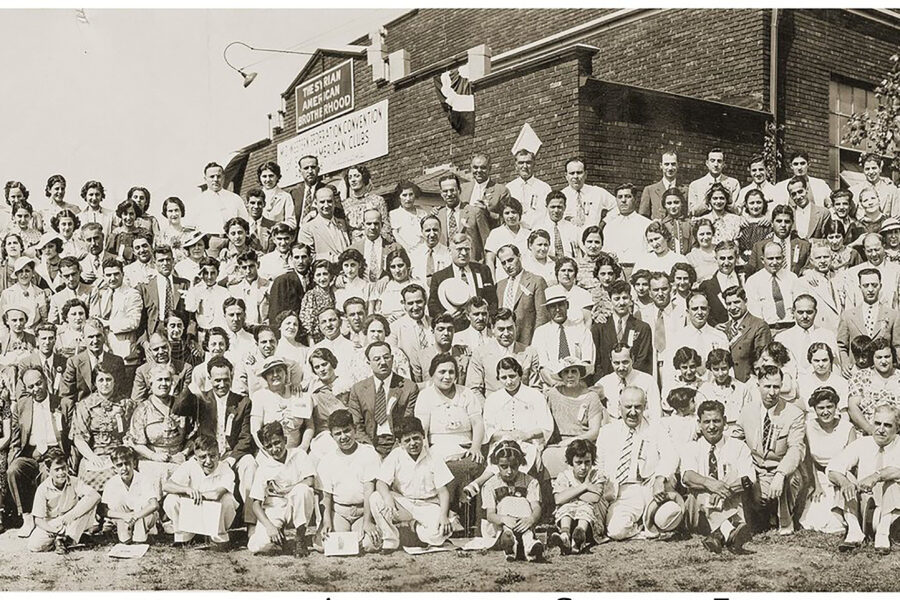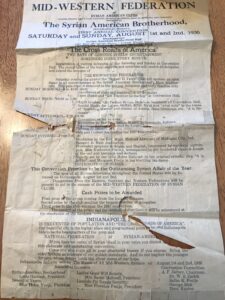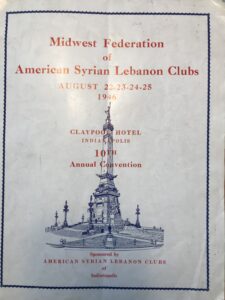
Raneem Hijazi has been hired to intern as the digital archivist for a unique collection of Arab American historical sources.

A tattered handbill from 1936 describes the convention during which the Federation was founded
Raneem is working with Anna Proctor of the IU University Library to digitize the archives of the Midwest Federation of Syrian and Lebanese American Clubs, which was established in 1936 at the Syrian American Brotherhood Hall in Indianapolis.The archives contains hundreds of documents ranging from annual convention programs and legal documents to correspondence among Arab American leaders.
This open-access archive will be unique. The National Museum of American History in Washington, D.C., holds the archives of the Eastern and Southern Federations of Syrian and Lebanese Clubs. But IU Indianapolis will be the only institution to archive the Midwest Federation’s collection.
The funding for Raneem’s position is made possible through a grant from the Arab Indianapolis Foundation, which oversaw the creation of the Arab Indianapolis public history documentary and book. The archives themselves were shared by Thomas Tadros, the president and historian of the Midwest Federation, with Edward Curtis, the Arabic Studies program director and former president of the Arab Indianapolis Foundation.
We were able to sit down, virtually, with Raneem for an interview about what prompted her interest in library sciences and the Midwest Federation collection.
Q. Can you tell us a little bit about your background? Where you grew up? Your roots?
A.I was born and raised in Indiana. I am a Palestinian from Al-Khalil, also known as Hebron. Most of my family experienced ethnic cleansing campaigns in Palestine either in 1948 or 1967 where their entire villages were forcefully depopulated, making multiple family members generational refugees. My grandparents all currently live in Jordan, and I visit often. I have two undergraduate degrees from IUI, one in Drawing and Illustration from Herron and one in Media Arts and Sciences from Luddy. I’m an illustrator who focuses on Palestinian cultural heritage, and you can see my work on my website. Now, I’m in my last semester as a Masters in Library and Informational Sciences student in Luddy.
Q. How did you become interested in library sciences?
A.I originally wanted to get into something related to entertainment art, either in video games or as a marketer, but after witnessing the land theft of Sheikh Jarrah in 2021, I decided that I wanted to help preserve Palestinian culture and make it more accessible to Palestinian diaspora around the world. I figured that going into Library Sciences would help achieve that goal.
Q. What are your hopes for your career?
A.My biggest dream is to increase the accessibility of Palestinian culture to Palestinians around the world. I hope to be involved in digital archiving projects that let people learn even if they cannot visit the homeland themselves.

The archive contains a large number of annual conference programs, including this one from an Indianapolis meeting in 1946.
Q. Why were you interested in applying to work on the Midwest Federation of Syrian American clubs collection?
A. I’m an Arab Palestinian who grew up in the Midwest — so I’ve always been interested in how Arabs make community within the Midwest and this project involved Bilad Al-Sham [Greater Syria], which has a rich culture that I’ve always wanted to learn more about.
Q. How important are digital collections to understanding Arab American life? or Why?
A. I think digital collections can make culture accessible to any diaspora community no matter where they may be. For Arab American digital collections, a museum that comes to mind is the Museum of the Palestinian People, which has a virtual museum you can access. Since this museum has Palestinian curators, you can see what sort of issues and concerns the Palestinian people have through the curation methodology itself. Why did they include this piece? What is the significance of this Thobe (Palestinian traditional dress)? What is the history of this piece of glasswork from Al-Khalil? Things like that can help you understand what Palestinians are proud of and want to talk about — which makes people have a better understanding of the culture even if they’re not a part of it.
Q. Do you think more Arab Americans should go into library sciences? Why?
A. Arab culture back home was very heavily concerned with libraries and the dissemination of knowledge throughout history. There’s a rich tradition of library work in Arab culture — most American library sciences theories rely on European understandings of libraries, and it would be interesting for more Arabs to provide their insight within the field to better diversify strategies. It also helps to have an Arab on a curation/collection management team that focuses on Arab history — they can provide context for certain items and can ensure things are talked about respectfully.


